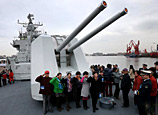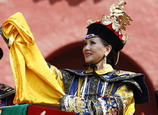
Beijingers avoid window seats in restaurants, preferring to eat in private rooms in the back. Even faculty cafeterias at universities or state-run newspapers have private rooms for elite dining.
As for booking a table at the most exclusive places in town - forget it. They often don't even have signs on their doors. Metropolitan interviewed politicians, businessmen, restaurant owners and even paparazzi to get the inside scoop on where Beijing's elite dine out. Some of the spots are hiding in plain sight, if you know where to look.
Behind closed doors
When Susan Baker, wife of former US Secretary of State James Baker, visited Beijing in 1991, she planned to eat at the humbly-named Li Family Cooking restaurant, hidden in a residential neighborhood near Houhai in Dongcheng district.
However, she couldn't get a reservation, though she tried up to the very last minute. In the end, she had to switch restaurants.
"That was free advertising for us, especially after the Washington Post printed that story," said Wang Shangyi, married to Li Aiyin, the fourth-generation head of the restaurant.
Li's restaurant stands as part of a hushed culture of private dining rooms that have opened up throughout the capital, often behind plain, unmarked doors. Some of the restaurants, like Li's, have been actively courting the wider public, but others choose to remain exclusive, and their reputation spreads solely by word of mouth.
Li's restaurant sits quietly between private homes in Yangfang Hutong, with only a simple sign on the door. Although the owners translate the name of their restaurant into English as Li's Imperial Cuisine, the interior maintains the homey feeling of the Chinese name, with a traditional square courtyard and rooms furnished with wooden tables and chairs.
The family-run establishment depends on word of mouth for new customers. Despite or perhaps because of this, it has drawn a pool of high-end clients, from foreign ambassadors to businessman David Rockefeller, sports idol Muhammad Ali and the last emperor Puyi himself.
Li Aiyin's great-grandfather served as an imperial chamberlain, responsible for overseeing security issues and the imperial kitchen that served Empress Dowager Cixi, who ruled over the last days of imperial China.
At that time, each meal Cixi ate had more than 100 luxurious dishes and combined the best foods from the Han and Manchurian ethnic groups, as well as other minorities. The recipes for the cuisine stayed strictly inside the imperial court and were hard for ordinary families to enjoy, Wang said.
When Cixi passed away in 1908, Li's great-grandfather retired, bringing with him the secret recipes that have stayed within the family since.
"For years, only the Li family knew how to cook such meals and we would cook when there were weddings and funerals. It wasn't open to the public," Li recalled. It wasn't until the establishment of the restaurant in 1985 that the public got a taste of what the ancient emperors used to eat, Wang added.
The restaurant has recently opened up more than ever, offering set meals starting at 298 yuan ($48) per person, though prices certainly go up from there, topping out at 2,608 yuan a head.
Wang declined to reveal any of his family's recipes, such as their signature steamed sea cucumber, saying that even though the restaurant is open to public, the recipes stay secret within the family.
Latest development of H7N9 in China[Special]
















 Giant pandas safe in quake-hit zone
Giant pandas safe in quake-hit zone


![]()
